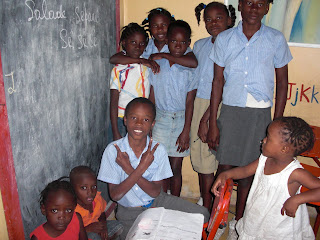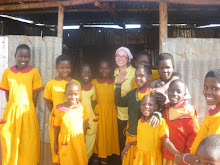My schedual is all up in the air and i'm just going to go with the flow when I get there, but I know what i'll be doing and where. I'm very excited to be going to the capital, Santo Domingo, for the first time. My plan is to take the bus out of Puerto Plata in the morning. I should arrive by 12:00 noon. We're going to check into a hotel and then go from there and explore as much as we can. If anyone has any suggestions of places to visit, please let me know. The following day, I will be meeting with my sponsor child Nelanda and spending the day with her.
The rest of my time will be spent in Puerto Plata where i'll be volunteering and visiting with my other sponsor children. I will also be visiting some grassroot schools, which serve in predominently Haitian communities known as bateys. I visited a classroom in Agua Negras(a Dominican/Haitian community),where I volunteered last March. This classroom was one room and very tiny. It taught the children how to speak and write in Spanish, a mandatory skill to live and get by in the Dominican Republic. It did not however(from what I remember) follow a school curriculum with math, social studies, geography, etc. I really don't see how much brighter these children's futures can get with just Spanish.. It's been something that been on my mind(education in general) but just how far can education can really bring a child? Do I beleive it is the awnser to extreme poverty, yes. Do I beleive it is the awnser to poverty, no. Did I just confuse you, yes. ;)
The world bank defines poverty as living on less than $1.25 a day, and poverty or "moderate poverty" as living on less than $2 a day. A picture image of extreme poverty could be a child malnourished living in a mud hut. A child living in poverty could live in a corrugated metal house, not reaching growth milestones and lacking a good diet, but not suffering from severe malnourishment. It's deffinetly not this black and white, and every home has their own situation but that's just to show the slight difference.
How does this tie into education? There seems to be a huge focus on primary school education. This for the most part is happening, and it is good. But is it great? Nope. It would be great if the child could continue and then go on to high school, college and then university, that would be great. But the system in developing nations is being cut off at primary school. It is set up to get the kids out of extreme poverty and keep them in poverty. I don't mean big brother is doing it or a government conspiracy(who knows ..) but "that's just the way it is." And why is that? I have been speaking to some people on the topic of Haitians in the Dominican and how I think too much time and money is being spent in the wrong areas in terms of development, and how WAY more needs to go into QUALITY education. And finding reasons and then solutions to the fact that the Dominican Republic ranks as one of the worst education systems in the Carribean, right after Haiti.
There are laws that Haitians without papers(birth certificates/passports) can go to school up until a certain grade and then it's aurevoir and adios. I'm not sure the complete law so don't quote me there as I don't even know if this is applicable in all parts of the country. But talking to a certain individual, I was told "well it's better than Haiti." I think this is the mentality that is keeping the world's poor from not just escaping extreme poverty, but really succeeding. 40% of Dominicans live in poverty, 70% of Haitians and Haitian descendents live in poverty. So while it is a step up from Haiti, it is no where near a huge leap.
A child will stay in the free government enrolled primary school or NGO school, learning basic math and they may even get a good grasp on English. These are tools that can help provide them with the basic needs of life. The Dominican Republic is a tourist destination but there are only so many hotel workers each place needs. There is also the horrible problem of child prostitution which is booming in the DR, I wonder if basic skills push children into this direction?
In school, I was always taught that when you're writting about a problem, to write about possible solution. The solution is definetly complex but here's my take at it. Sticking with education and correcting the system. I have found a few good NGOs running schools for mostly Dominican children, while the schools targeting the Haitian population seem to be running on quantity over quality. Some NGO have built schools in the area(very nice ones too) but the curriculums are always similar and are focused at just teaching Spanish. Like I mentioned before this is a necesary skill to have, but how far will it take the children? Maybe they can sell more hard boiled eggs are shine more shoes because they feel more comfortable talking to customers? The grassroot schools I plan on visiting are not considered schools in the sense that they are not registered, but they do try and teach the kids a number of lessons. They are generally run out of small rooms in the community or church houses, over packed and understaffed. Where is the happy medium?
Note on the comparison to Uganda..
There are some differences to schools in Uganda and many similarities. The biggest difference that comes to mind is the hours the children are in school. In Uganda, schools starts at 7:00am sharp and ends at 1:00 for the nursery kids. That's a 6 hour day for children as young as 3. From P.1-P.7 school runs from 7:00Am until 5:00Pm. That's a 10 hour day! In the Dominican Republic however, school is usally half days with with children either morning or afternoon students. There is no doubt that there are many schools in Uganda who are poor and suffering many of the same social problems as schools in the DR. In Uganda, they know some children will drop out unfortunetly but the ones who stay and continue into the higher grades are pushed to do better, better, and even better. They are always preparing them for the next level of school, even if they have do not know how they will pay for it they're praying and studying even harder. It's very competitive. Where as the system in poor schools in the Dominican is setting the children up so they will learn what they need to learn to work in the tourist industry.
Thoughts, opinions? Would love to hear them! Leave a comment or e-mail me.






1 comment:
Loooooved this post. It has been on my mind a lot lately. I could write an essay with my responses, haha, but I will just leave it at that I am going to be focusing on education when I am moving to the DR; and I don't mean just teaching english, but preparing the kids to go to high school and then University, and hopefully raising money for high school and University scholarships. But starting with basic literacy, encouraging a love of reading, etc. Lots of ideas... not sure exactly which direction I will take it in. Love your post though, and 110% agree.
Post a Comment